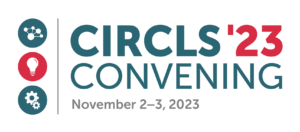- Overview and Theme
- Keynotes and Plenaries
- Project Info Pages
- Convening Agenda
- Acknowledgments
Project information pages are a new way for researchers to showcase their NSF project findings and innovations. We strongly encourage all NSF learning technology projects to complete a project page to facilitate building connections and sharing your project impacts. With the sunsetting on the RETTL program (and the sun rising on RITEL!), they are also a great way to demonstrate what the RETTL program accomplished and how this work impacted the field.
See the full list of project information pages below. We encourage CIRCLS’23 participants to review the pages in advance and identify a few projects you would like to connect with at the convening! Use our Brokering Tool to learn about even more projects in our community!
- Academical: A Dynamic Narrative Learning Environment for Innovating Online Ethics Training: 2202521
- AR/AI-Empowered Learning of Spatial Transformations and Mathematical Representations: 2119549
- Artificial Intelligence for Advancing Instruction: 2000487
- Argument Graph Supported Multi-Level Approach for Argumentative Writing Assistance: 2302564
- Using Augmented Reality to Enhance Attention in STEM Learning for Students with Executive Function Disabilities: 2202291
- Bimodal Haptic-Mixed Reality Needle Insertion: 2118389
- Broadening Participation in Informal STEM Learning for Autistic Learners and Others through Virtual Reality: 2005447
- Collaborative Research: Development of Natural Language Processing Techniques to Improve Students’ Revision of Evidence Use in Argument Writing: 2202347, 2202345
- Collaborative Research: Sizing Up Physical Computing to Explore Threshold Concepts in Cyber-Physical Systems: 2302787
- Collaborative Research: Worksite-specific Safety Training Environments with Augmented Reality: 2302819
- Collaborative Research: Common Error Diagnostics and Support in Short-answer Math Questions: 2118706
- Computer-based Social Interactions to Facilitate Language Learning: #1757937
- Data Stories: Co-Designing Curricula and Tools with Teachers to Support Middle School Youth’s Critical Data Literacy through Remixing: 2302657
- Designing Mixed Reality Experiences to Support Participatory Complex Systems Learning: 2202431
- Developing Hands-on Virtual Reality Science Labs: 1918045
- Dialogue Engagement for Educational Robots: 1942955
- EAGER: Discussion Tracker: Development of Human Language Technologies to Improve the Teaching of Collaborative Argumentation in High School English Classrooms: 1842334
- Embodied Code: Creative Coding in Virtual Reality: 2017042
- Enhancing Programming and Machine Learning Education for Students with Visual Impairments through the Use of Compilers, AI and Cloud Technologies: 2202632
- Examining the Effects of Perceptual Cues on Middle School Students Online Mathematical Reasoning and Learning: 2300764
- Exploring Artificial Intelligence-enhanced Electronic Design Process Logs: Empowering High School Engineering Teachers: 2119135
- From Data Literacy to Collective Data Stewardship: Technology Supported Community-Driven Solutions for Urban Youth: 2016982
- Generalized Embodied Modeling to support Science through Technology Enhanced Play (GEM-STEP): AWARD 1908632 and 1908791
- Grasping Understandings of Students Mathematical and Perceptual Strategies Using Real-time Orchestration Tools: 2142984
- Impact of Utilizing Immersive Virtual Reality and Dynamic Assessment on Mining Engineering Education from the Community of Inquiry Perspective: 2202640
- Improving speech technology for better learning outcomes: the case of African American English (AAE) child speakers: 2202585
- Improving Student Learning While Decreasing Bias in Teaching Through Simulation: 2118849
- Inclusively-designing sensory extensions for STEM inquiry learning: 2119303
- Integrating Artificial Intelligence with Smart Engineering in Upper Elementary Education: 2119174
- An Intelligent Assistant to Support Teachers and Students in Simulation-Based Science Learning: 2302974
- Learning Software Engineering by Contributing to Real Projects With Chatbot Assistance: 2303042
- MathWalks- A Place-Based Mobile App: 2115393
- Measuring and Modeling Visual Attention in Online Multimedia Instruction: 2100071
- New Dimensions of ASL Learning: Implementing and Testing Signing Avatars & Immersive Learning (SAIL 2): 2118742
- NeuroVivid: Developing and Testing a Maker Experience to Build Interest in Careers in Brain-Computer Interfaces Among Neurodivergent Youth: 2241380
- Open Player Modelling in Games for Learning: 1917982
- Pair Programming with Intelligent Social Agents: 2302701
- Participatory Design for Human Well-Being: 2247790 and 2112532
- Productive Online Teamwork Engagement through Intelligent Mediation: 2113991
- Project mTEAM: Advancing Emergency Medicine Trainee Skills using Multimodal Debriefing System in Simulation-based Training: 2202451
- SBIR Phase I: A platform for cross-cultural collaborative learning by 6th-12th graders based on synchronous watching of international films from different locations: 2321956
- SBIR Phase I: CourseGPT™ Help-Seeking for Online Courses: 2151406
- Combining Smartphone Light Detection and Ranging with Augmented Reality to Enhance Position-Based Teaching and Learning in STEM: 2114586
- Smart Spaces for Making: Networked Physical Tools to Support Process Documentation: 1736189
- Story Studio: Coaching Data Storytelling at Scale: 2302794 & 2302795
- Strength Across Schools Partnership 2.0 to Teach Empowering Computational Thinking and Computer Science in Middle School English Language Arts Classrooms Award Abstract: 2317747
- Supporting Designers in Learning to Co-create with AI for Complex Computational Design Tasks: 2118924
- Supporting Early Learning of Computational Thinking Using Mixed Reality Technology: 2048989
- Transformative Computational Models of Narrative to Support Teaching Indigenous Perspectives in K-12 Classrooms: 2119573
- Transforming Undergraduate Engineering Education through Adaptive Learning and Student Data Analytics: 2013271
- Using AI to Focus Teacher-Student Troubleshooting in Classroom Robotics: 2118883

